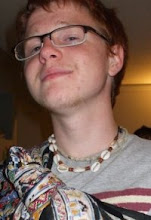In which Dawkins attempts to explain the origin of life
Dawkins begins this chapter by stating that the universe is inhabited by stable things. This is fairly obvious and "true by its definition" in Dawkins words. He then goes on to explain his theory on the origin of life.
First he mentioned an experiment preformed by chemists in which simple molecules are placed in a solution, energized, and then studied. He didn't mention the name of this experiment which made it a little difficult to find but I did find it. It was the Miller-Urey experiment. They were able to create 22 amino acids, the building blocks of proteins which in turn are the building blocks of life. Dawkins theory is that these amino acids, which formed in ancient Earth's oceans, randomly formed replicators, or molecules that were able to copy themselves. Well, as soon as you have a molecule copying itself there are bound to be transcription errors which will then lead to competition for resources, also known as evolution. As these replicators get better at competing they develop "survival machines" which Dawkins theorize are the first cell membranes and eventually organisms.
I really like this theory for its simplicity and scope. It explains a massive question with an extremely simple answer and I believe its the simple answers that are most commonly accurate. It all makes sense logically however its very far from being proven. The only thing I could think of that would validate this theory is if another Miller-Urey experiment were performed and a replicator were synthesized. The odds of this happening, Dawkins admits, are astronomically low but, of course, not impossible. Dawkins seems to be making the argument that because you can't prove that, that isn't how it happened then its safe to run on the assumption that it is. Humorously this seems analogous to the argument "God did it, you can't prove he didn't" towards which Dawkins feels so vehemently. I will admit it is a rung higher up on the ladder of what's probable. I'd like to mention that even in this chapter he made an attack on religion. He literally can not talk on any subject for any amount of time without attacking religion.
Subscribe to:
Post Comments (Atom)

No comments:
Post a Comment